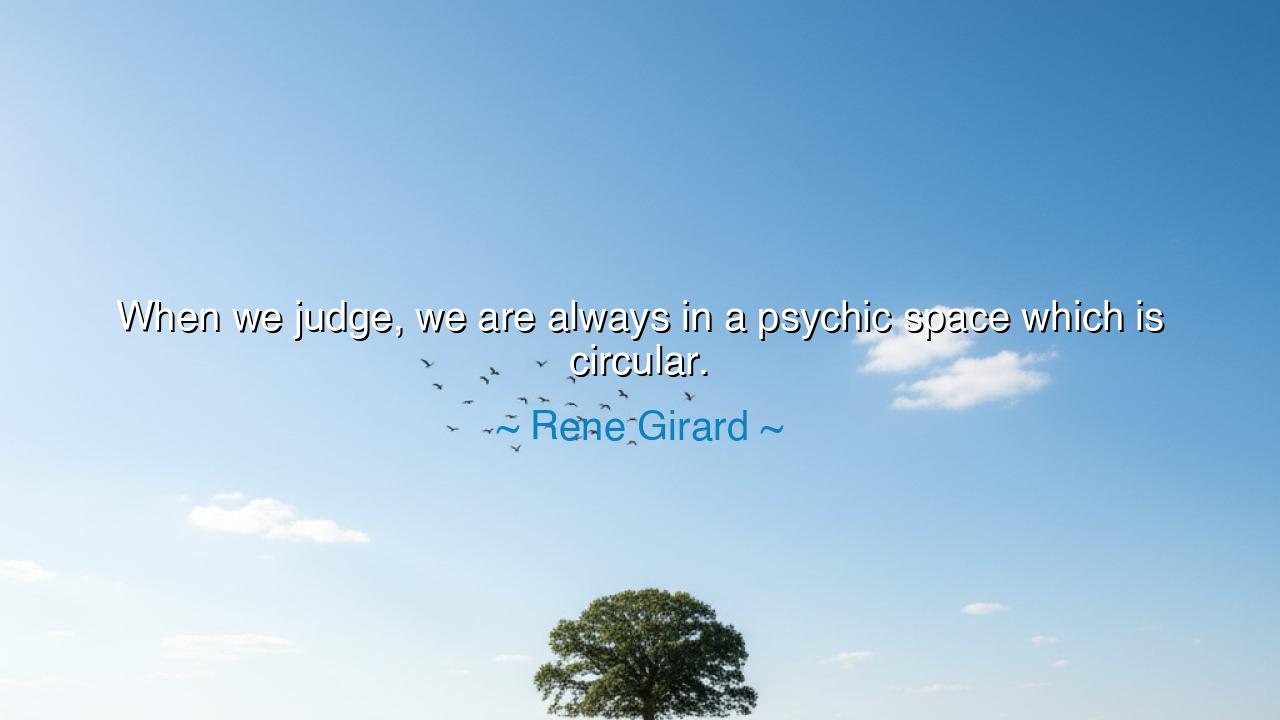
When we judge, we are always in a psychic space which is






Hear the words of René Girard, a thinker of deep vision, who declared: “When we judge, we are always in a psychic space which is circular.” These words are no mere puzzle, but a revelation of the hidden mechanics of the human soul. For Girard understood that when man sets himself as judge, he does not rise above his brother but enters a cycle—a circle of desire, rivalry, and condemnation that binds judge and judged together. Judgment is not the straight path of truth but a turning wheel, drawing us back to ourselves, reflecting our own faults even as we point to those of others.
For what is judgment but the mirror of our own desires? When we accuse, often we are accusing what we ourselves fear. When we condemn, we reveal the standards by which we, too, may one day be measured. Thus, the circular space: our judgments return to us, circling back like the seasons, binding us in the same net we cast upon another. The ancients knew this well, when they spoke of Nemesis, the goddess who humbles the proud. He who judges harshly shall be judged in the same manner, for the circle always closes.
History gives us a striking example in the tale of the French Revolution. Those who judged the monarchy, declaring it corrupt and tyrannical, soon became tyrants themselves. Robespierre, who sent countless to the guillotine with words of judgment, was himself consumed by that same blade. The Revolution turned in circles, devouring its children, proving Girard’s truth: to live in judgment is to walk within a circle of vengeance, from which none may escape.
Yet Girard also saw that judgment is tied to mimetic desire—the longing we inherit from one another. We covet what others covet, we despise what others despise, and so our judgments are rarely born of pure truth. Instead, they are echoes of the voices around us, forming circles of accusation, scapegoats upon whom we place our fears. The people stone one victim, thinking themselves righteous, yet in truth they are chained by the very cycle they feed. Thus, Girard warns us: beware the circular space of judgment, for it blinds us to truth and binds us to endless repetition.
Consider also the words of the Nazarene, who said: “Judge not, lest you be judged.” This is not mere piety, but profound insight into the circle Girard describes. To enter into judgment is to enter into reciprocity: the same measure you use will be used against you. The straight path of mercy, however, breaks the circle; forgiveness cuts the chain and sets both judge and judged free. Mercy is the line that escapes the circle, the light that rises above endless turning.
Therefore, O seeker, the lesson is clear: do not dwell in the prison of circular judgment. Examine yourself before condemning another, and see how your criticisms often reveal your own fears and desires. When tempted to judge, ask instead how you may understand, how you may guide, how you may forgive. In so doing, you step out of the circle and into a higher space, where truth shines without distortion.
In your life, practice this wisdom. When you see another falter, do not rush to the circle of condemnation, but pause and reflect. Ask: what of this is in me? What can I learn? How can I heal instead of wound? In this way, you will not be trapped in the cycle of rivalry and vengeance, but will walk the path of growth and peace. For judgment binds, but compassion liberates.
So let Girard’s words echo like a warning bell: judgment is circular, returning always to the one who casts it. Do not be ensnared by its endless turning. Instead, break the circle with humility, with mercy, with wisdom. Thus shall you walk not in circles, but in the upward spiral of growth, carrying yourself and others toward the light of true understanding.






AAdministratorAdministrator
Welcome, honored guests. Please leave a comment, we will respond soon